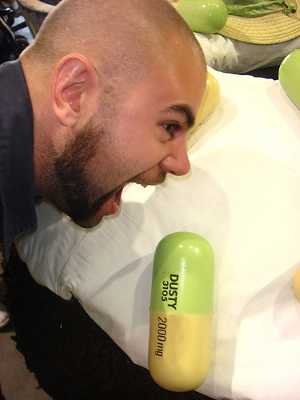The Antidepressant Industry's Dirty Little Secret
Is it really possible that a multi-billion dollar industry is founded on nothing more effective than a sugar pill?
 "Massive over-reliance on antidepressants?" courtesy of jm3
"Massive over-reliance on antidepressants?" courtesy of jm3Should you trust antidepressants? After all, you might be on them yourself (and if you are, then never just stop taking them without having a gradual phase-out plan in place). Or perhaps you know someone who's on them? Maybe a loved one. They wouldn't be on the market if they didn't work, right?
They must have been properly tested! By people in white coats who don't have a vested interest. After all, depression can be explained away as a 'chemical imbalance'; so let's treat it with chemicals! Surely! No? Come on, what's the problem here?
Okay, fasten your seatbelt; this may be a bumpy ride.
Antidepressants: What's claimed of them?
Drug companies claim that more than 80% of depressed people can be successfully treated with antidepressants (1). But can we trust this? After all, if they're that successful, why are so many people depressed? How are these chemicals tested before they get into the mouths of depressed folk?
The power of belief and money
Let's get this clear: Placebo is powerful.
A placebo pill is an inert substance that the person receiving it believes to be an active chemical substance. When people believe a sugar pill is an active drug (such as an antidepressant), that belief creates a powerful expectation. And it's that positive expectation that creates the cure (2).
Just the knowledge that you're being treated can help you get better. This is the placebo effect - and it's a problem for drug researchers.
A drug company can run and publish its own studies (feel free to sound alarm bells at this point). It needs to 'prove' (or seem to prove) that the drug it wants to sell works better than a placebo. Otherwise, people would be paying money for a chemical that has nasty side effects, yet doesn't work any better than a placebo sugar pill.
Imagine!
Getting down and dirty
Okay, let's keep imagining. Imagine if a drug being sold globally to the tune of $19 billion a year (3) was nothing more than a placebo. Now imagine it was an 'active placebo' (meaning it produces side effects, but not the cure people believe it does).
Imagine that placebo could cause:
- Inability to achieve an orgasm (men and women).
- Anxiety.
- Dry mouth.
- Urinary retention.
- Blurred vision.
- Constipation.
- Sedation (can interfere with driving or operating machinery).
- Sleep disruption.
- Weight gain.
- Headache.
- Nausea.
- Gastrointestinal disturbance/diarrhea.
- Abdominal pain.
- Inability to achieve an erection.
- Loss of libido.
- Agitation.
Imagine! Wouldn't it be better just to have the sugar pill? So what's the dirty little secret?
You're not imagining it.
What they don't want you to know
Antidepressants (and other drugs) come to market after being tested in 'double blind trials'. This means that neither the prescriber nor the 'receiver' of the drug (the patient) knows whether what they are given for their depression is a placebo or the real antidepressant. But sometimes a patient will 'break blind'. That means they'll correctly guess they were put on the real drug (because they start experiencing real side effects). During a drug trial, there need to be three groups:
- Those given the real antidepressant.
- Those given 'dummy pill' placebos.
- Those not treated in any way.
So how do antidepressants perform against placebo?
Irving Kirsch and Guy Sapirstein carried out a huge meta-analysis study, from the start expecting to find antidepressants to be more effective than placebo. However, they found no 'clinically significant' difference between improvement rates of people put on dummy sugar pills and those put on genuine antidepressant meds (4).
Other studies - another in 1996, for example - found that antidepressants perform only slightly better (but not to a 'clinically significant level') than sugar pills in the treatment of depression.
Oh, so antidepressants do perform slightly better than sugar pills, right?
Mm...
Depression and the active placebo
Not so fast. When a patient 'breaks blind' in a drug study by guessing they've been given the real drug because of side effects, their expectations change: "Ah, I'm on the real drug, not the placebo!" And, paradoxically, that can increase the placebo effect of the real drug they're on. Oh! That's another problem for researchers.
But the tiny bit better performance of the real antidepressant medication over placebo all but disappears when people are given 'active placebos' (placebos that produce real side effects). Active placebos are more likely to work because people believe they have 'real proof' that they are on the real antidepressant; the 'real proof' being the real side effects.
So how do drug companies get around the fact that antidepressants don't really outperform placebos for depression?
Another dirty little secret (5)
Drug companies, of course, claim their antidepressants work better than placebo, even though independent researchers don't find this. How so?
Oh, come on; I'm sure this isn't new to you, but let's quickly explore it together because it does beggar belief, doesn't it? Drug companies are a bit naughty. Why? Well, they will:
- Conduct their own studies (although they're allowed to).
- Withhold studies from publication that show antidepressants to be ineffective (v. placebo).
- Only publish studies that seem to show a positive correlation (known as 'cherry picking').
- Publish positive studies multiple times to make one study look like lots of different ones.
- Publish only some of the results from studies (the bits that seem to show antidepressants in a favourable light). One way this is done apparently is by 'burying' negative data in text but leaving it out of published graphs.
- Ignore people who drop out of the trials.
- Not include those who have been pre-tested as responding well to placebo in the trial itself.
- Not ask about side effects (and therefore not publish them) (6).
I would call doing all that 'naughty', wouldn't you?
So that's a secret worth knowing. You can bring a drug that works no better than placebo to trial as long as you can make it look as if it does! Doing this with antidepressants is worth $19 billion a year, apparently!
Okay, so antidepressants don't seem to work, but what is the theory behind treating depression with meds? Is unhappiness or clinical depression really caused by 'bad genes' (the so called reductionist model for depression)?
I won't keep you long, because I know you've got exercise to do. (Exercise has been shown to be as effective at lifting depression as antidepressants and also better at preventing relapse - and with only good side effects! (7) )
The biomedical myth of depression
Here's the deal: If you have a solution which can be sold for big bucks, then you need to find or create a problem so you can sell your solution. Depression is a massive and genuine problem in industrialized countries worldwide and is increasing (8).
Clinical depression has been reduced to a biochemical 'disease' (coincidently convenient for drug companies selling a solution to a biochemical problem!). Depressive attitudes, so the biomedical model would have you think, are not learned from parents (as you'd expect them to be) (9), but 'passed on through the genes'.
And people talk as if there is real scientific evidence for this. There isn't.
Here's another 'secret'. The newer SSRI (Selective Serotonin Reuptake Inhibitor) drugs - like everybody's favourite, Prozac; Cipramil; Lustral; and so on - have never been shown to work any better than any other type of old-style, tricyclic antidepressants. No antidepressant works any better at lifting clinical depression than any other antidepressant (10). I don't think big pharmaceutical companies have been particularly clear about that, do you?
So what's all this about serotonin, then?
The newer, fancy, well-marketed SSRIs are believed to act by inhibiting the reuptake of serotonin after it's been released in brain synapses. Basically, the biomedical model has it that depression is caused not through, say, dwelling on a divorce, but through a lack of the 'feel good chemical' serotonin in the brain of a genetically predisposed person.
So if serotonin is too low in depressed people, artificially raising levels of serotonin in the bloodstream is supposed to help depressed people get better. Sounds reasonable.
But if this was the case, you'd think that artificially lowering serotonin and dopamine in non-depressed people would produce depression (11) - it doesn't. In fact, rapidly lowering serotonin in the brain does not affect a person's mood in the slightest. Lead researcher Irving Kirsch calls this the final 'nail in the coffin' of the biomedical/low serotonin theory for depression. Billions of dollars, hundreds of millions of people; is this all built on little more than slick snake oil selling?
It gets worse for the serotonin model.
Another nail in the serotonin coffin
In France, the antidepressant Tianeptine (sold as 'Stablon') was developed and is now marketed as - wait for it - lowering serotonin in the brain. And, you've guessed it; it works just as well as any other antidepressant or placebo. Holy moley!
I want to emphasize again that the whole premise on which the massive antidepressant industry rests - the idea that depression is caused by lowered levels of available serotonin in the brain - has been shown to be wrong.
This is not to say that being depressed doesn't have some genetic base, but no evidence points that way; and serotonin levels are not the mechanism by which this would work. Also, being depressed (or laughing) has neurochemical consequences which may be mistaken for causes.
The end of my rant
I personally have nothing against big pharmaceutical companies, even though in a $150 billion industry (80% of which comes from patented drugs developed over the last ten years), only 14% of profit is spent on research and development as compared to 31% on marketing and administration. I am not anti-medication, per se. But I am against medication that isn't really medication at all.
It wouldn't matter so much that antidepressants are basically active placebos if:
- People weren't paying and making so much money for and out of them.
- The side effects weren't so potentially nasty and dangerous. For example, suicide risk in those under 24 has been shown to double in people who start taking SSRI meds (over placebow) (12).
I'm not the sort of guy that is going to drunkenly buttonhole you at parties, channelling Dan Brown and talking about Illuminati conspiracy theories or big business/governmental plots. I'd rather just have a beer and relax.
But I do think all this is seriously worth thinking about.
References
- See The Emperor's New Drugs: Exploding the Antidepressant Myth (2009) by Irving Kirsh.
- For a fascinating glimpse of just how powerful placebo can be, see Dr Ben Goldacre's chapter 'The Placebo Effect' in his book Bad Science.
- John P.A. Ioannidis, 2008; Jeffrey Lacasse and Jonathan Leo, 2005. 'CNS Drug Discoveries: What the future holds 2008'.
- See The Emperor's New Drugs, Chapters 1 and 2.
- I borrowed this term from Irving Kirsh, who uses it when describing drug companies' dirty tactics (see pg. 23 of The Emperor's New Drugs).
- All this is pretty well known and for a witty and acerbic commentary of some of these 'big pharma' tactics, see what Ben Goldacre has to say in Chapter 11 of Bad Science.
- James A. Blumenthal, Ph.D. and his colleagues surprised many people in 1999 when they demonstrated that regular exercise is as effective as antidepressant medications for patients with major depression. The researchers studied 156 older adults diagnosed with major depression, assigning them to receive the antidepressant Zoloft (setraline), 30 minutes of exercise three times a week, or both. According to Blumenthal, "Our findings suggest that a modest exercise program is an effective, robust treatment for patients with major depression who are positively inclined to participate in it. The benefits of exercise are likely to endure, particularly among those who adopt it as a regular, ongoing life activity."
- The incidence of clinical depression has risen 1000% over the last fifty years. Genetic evolution doesn't happen that quickly, so perhaps we are seeing increased depression, suicide, and suicide attempts as a collective response to the way many of us are living now. This increase in depression accounts for the de-stigmatizing of the condition and an increased willingness to admit to being depressed. See: David O. Antonuccio and William G. Danton, University of Nevada School of Medicine and Reno Veterans Affairs Medical Center Garland Y. DeNelsky, Cleveland Clinic Foundation: "Psychotherapy the best medicine", and their meta-analysis of over 100,000 pieces of research into the causes, consequences, and best treatments for clinical depression, conducted 1978-1993.
- See Dr Michael Yapko's marvellous Hand-Me-Down Blues: How to Stop Depression from Spreading in Families. St. Martin's Press. July 14, 2000.
- Wagstaff, Ormrod, and Spencer. 2001.
- At least 90 studies have been done to see what happens when monamine levels are reduced in people. A meta-analysis of this research conducted at The University of Amsterdam found no evidence that lowered serotonin acted as a depressant. H.G. Ruhe, N.S. Mason, and Aart H. Schene. 2007.
- Tarek A. Hammad, Thomas Laughren, and Judith Racoosin. 2006. This is extremely worrying, as many young people are still prescribed SSRIs despite the risks.





